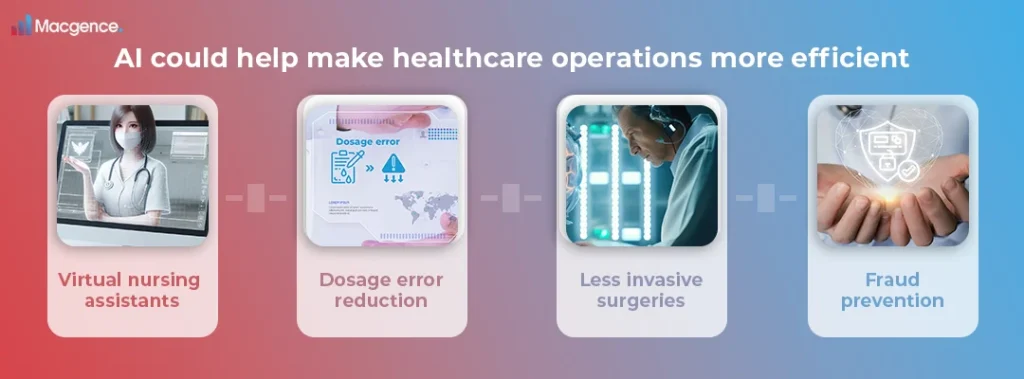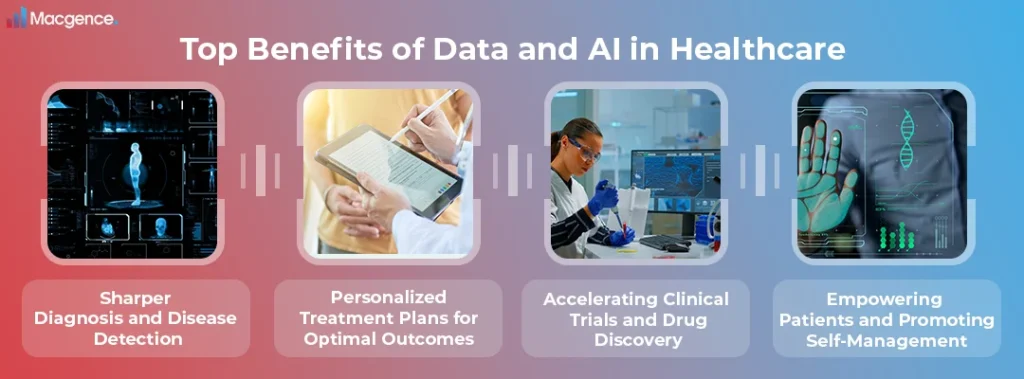The healthcare industry has significantly benefited from the significant advancements in medical data collection. Artificial intelligence (AI) can dramatically impact the healthcare industry. To understand the impacts of AI in the healthcare industry, one must know precisely what artificial intelligence is and the different areas where it is used to improve healthcare. Here is a detailed overview of data collection, how AI can help make data collection more accessible, how it enhances patient experience, and much more.
What Is Medical Data Collection in Healthcare?
Medical data collection in healthcare is the process of gathering, analyzing, and using information harvested from various data sources. Data collection may serve many purposes and help a provider achieve several goals. For example, patient demographic data may be valuable for marketing services, building more effective care plans, or enhancing patient perceptions of care.
In general terms, medical data collection in healthcare falls under two categories: quantitative data and qualitative data. Quantitative data is often numerical, whereas qualitative data is more conceptual, with words and descriptions instead of numbers.
AI could help make healthcare operations more efficient

Healthcare organizations are using AI to improve the efficiency of all processes, from back-office tasks to patient care. The following are some examples of how AI could be used to benefit staff and patients for better medical data collection:
- Virtual nursing assistants
One study found that 64% of patients are comfortable using AI for around-the-clock access to answers that support nurses provide. AI virtual nurse assistants—AI-powered chatbots, apps, or other interfaces—can help answer questions about medications, forward reports to doctors or surgeons, and help patients schedule a visit with a physician to improvise medical data collection. These routine tasks can help take work off the hands of clinical staff, who can spend more time directly on patient care, where human judgment and interaction matter most.
- Dosage error reduction
AI in medical data collection could help identify errors in how a patient self-administers medications. One example comes from a study in Nature Medicine, which found that up to 70% of patients don’t take insulin as prescribed. An AI-powered tool that sits in the patient’s background (much like a Wi-Fi router) could be used to flag errors in how the patient administers an insulin pen or inhaler.
- Less invasive surgeries
AI-enabled robots could work around sensitive organs and tissues to help reduce blood loss, infection risk, and post-surgery pain.
- Fraud prevention
Fraud in the medical data collection is enormous, at $380 billion/year, and raises the cost of consumers’ medical premiums and out-of-pocket expenses. Implementing AI can help recognize unusual or suspicious patterns in insurance claims, such as billing for costly services or procedures not performed, unbundling (billing for the individual steps of a method as though they were separate procedures), and performing unnecessary tests to take advantage of insurance payments.
How will Medical Data Collection Improve Patient Experience?
Medical data collection methods and big data technologies have altered and influenced the healthcare industry in several ways. Data collection can directly help combat existential diseases efficiently and forecast pandemics. It can also solve local organizational issues, such as reducing workloads and healthcare agency profits. Hence, data collection plays a vital role in improving patient experience.
To put it concisely, some of the ways by which medical data collection can directly help in improving patient experience are as follows:
- Creating a holistic view of patients
- Personalizing treatments
- Advancing treatment methods
- Improving communication between patients and doctors
- Enhancing health outcomes
Top Benefits of Data and AI in Healthcare

The powerful combination of data and AI transforms the healthcare landscape, delivering tangible benefits across various aspects of medical practice.
Let’s go deeper into the top 5 benefits that illustrate the transformative potential of AI in healthcare:
1. Sharper Diagnosis and Early Disease Detection
Data-driven AI algorithms are trained on vast medical records, images, and other health information datasets. This empowers them to identify subtle patterns and anomalies that could be missed by the human eye, leading to earlier and more accurate diagnoses.
For example:
- AI algorithms can examine X-ray photos, detecting early signs of lung cancer or other illnesses before signs and symptoms appear. This permits intervention and life-saving treatment.
- Analyzing genomic data lets AI perceive genetic markers connected to precise sicknesses, enabling healthcare providers to evaluate individual danger and provoke preventive measures.
2. Personalized Treatment Plans for Optimal Outcomes
The amount of data available to AI goes beyond just diagnosis. It also includes information about individual patient responses to treatments, their genetic profiles, and lifestyle factors. This comprehensive medical data collection methods allows AI to create personalized treatment plans tailored to each patient’s needs and circumstances.
For example:
- By analyzing a patient’s genetic profile and historical treatment responses, AI can identify the most effective medication for their specific condition, minimizing the risk of side effects and optimizing therapeutic outcomes.
- AI-powered chatbots can provide personalized support and guidance to patients, ensuring they adhere to their treatment plans and make informed decisions about their health.
3. Accelerating Clinical Trials and Drug Discovery:
Traditional clinical trials are often lengthy and expensive, hindering the development and availability of new drugs and treatments.
Data-driven AI can significantly streamline this process by:
- Identifying promising drug candidates for further testing based on their predicted effectiveness and safety profile.
- Analyzing data from past clinical trials to identify potential risks and optimize future trial designs.
- Virtualizing aspects of clinical trials, such as patient monitoring and data collection, reduces costs and accelerates the overall process.
4. Empowering Patients and Promoting Self-Management:
AI-driven tools are increasingly being used to empower patients and promote self-management of their health. These tools include:
- Mobile apps: Personalized apps can give patients access to their medical records, medication reminders, and educational resources about their condition.
- Chatbots: AI-powered chatbots can answer patients’ questions, offer emotional support, and guide their health conditions.
- Wearable devices: By integrating with wearable devices, AI can track patients’ vital signs, activity levels, and other health data, providing valuable insights into their overall well-being.
These tools enable patients to play a more active role in their healthcare, leading to improved adherence to treatment plans and better health outcomes.
Macgence and their role in Data and AI
Macgence sits at the intersection of data and AI in healthcare, ensuring that medical data collection with AI gets the data it needs.
1. Collecting High-Quality Data:
Macgence meticulously collects and anonymizes medical data collection, ensuring both quantity and quality. They adhere to strict ethical and regulatory standards, safeguarding patient privacy while building valuable datasets for AI research. This includes:
- Patient records: Macgence gathers comprehensive patient information from various sources, including electronic health records and clinical trial data.
- Medical images: They collect and curate a vast collection of medical images, such as X-rays and MRIs, which are crucial for training AI algorithms to analyze and interpret them.
- Real-world evidence: Macgence goes beyond traditional data sources by capturing real-world insights, like patient experiences and feedback, providing a more holistic picture of healthcare.
2. Unparalleled Data Diversity:
Macgence offers an unmatched array of data sets in the industry. This includes:
- Data types: Macgence offers unique and valuable medical data collection methods beyond the standard data sets. This allows clients to explore more comprehensively and develop more accurate and effective AI solutions.
3. Seamless Client Access and Utilization
Macgence facilitates seamless access to their data for clients, streamlining the process of AI research and development. They offer:
- Efficient data-sharing protocols provide precise and efficient processes for clients to access and utilize their needed data.
- Dedicated support: Macgence offers expert support to clients, ensuring they get the most out of their data and achieve their research goals.
Conclusion
In summary, Artificial intelligence (AI) is reshaping medicine’s future, and medical data collection techniques is what make this possible. AI aims to improve healthcare for the general population by leveraging real-time data to optimize anything from ambulance routes to waiting times. The development of chatbots to aid patients, track their progress, and send notifications tailored to their health is advancing significantly thanks to conversational AI. Some of these initiatives may conduct whole visits from the patients’ homes, and by assessing the symptoms and examining the information provided, they can direct the patient toward treatment or specialized appointments.
FAQs
Ans: – Data is the input for AI algorithms, acting as the foundation for learning and decision-making. AI processes and analyzes data to identify patterns, correlations, and trends, ultimately producing valuable insights or actions based on the learned patterns.
Ans: – AI can only effectively work with data. Data is the core element that allows AI to learn, adapt, and perform tasks. The absence of data hinders the training and improvement of AI models, limiting their ability to make informed decisions.
Ans: – The role of data in AI and machine learning (ML) is fundamental. Data is used to train models in ML, enabling AI systems to recognize patterns and make predictions. High-quality, diverse datasets are crucial for developing accurate and robust AI and ML models that effectively tackle real-world challenges.
Macgence is a leading AI training data company at the forefront of providing exceptional human-in-the-loop solutions to make AI better. We specialize in offering fully managed AI/ML data solutions, catering to the evolving needs of businesses across industries. With a strong commitment to responsibility and sincerity, we have established ourselves as a trusted partner for organizations seeking advanced automation solutions.




